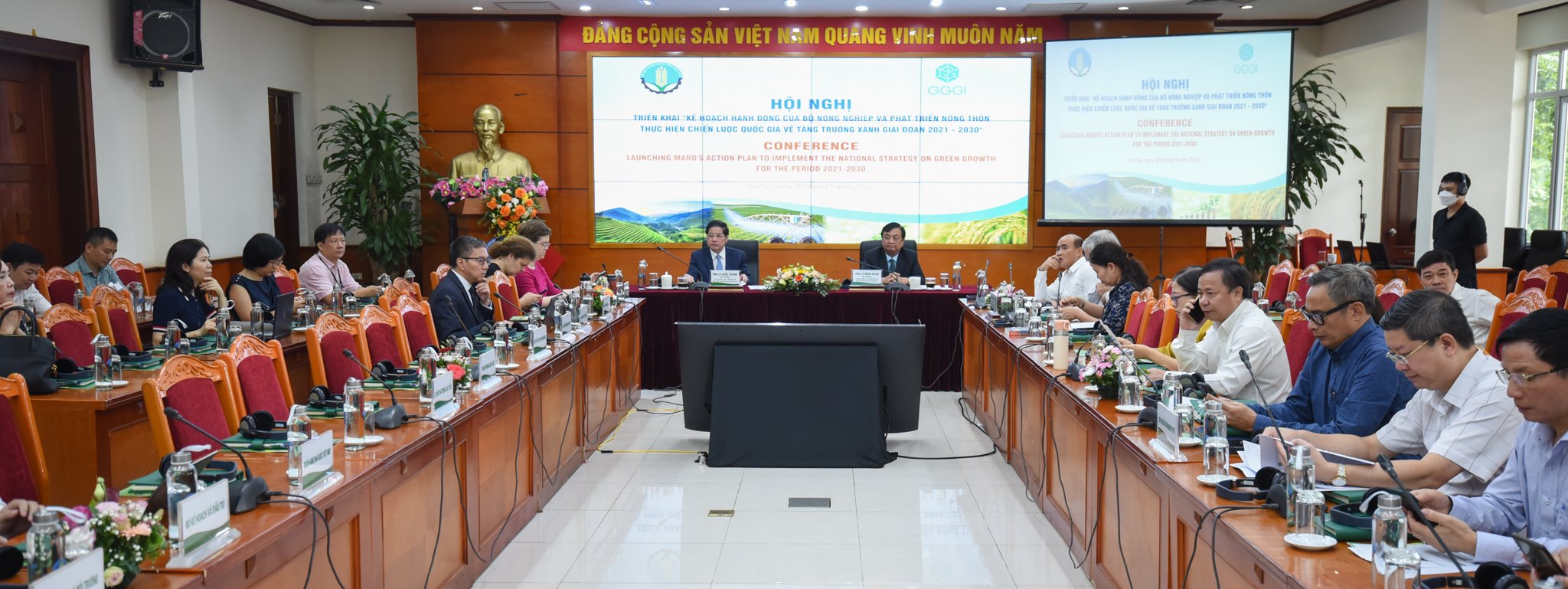May 24, 2025 | 16:22 GMT +7
May 24, 2025 | 16:22 GMT +7
Hotline: 0913.378.918
May 24, 2025 | 16:22 GMT +7
Hotline: 0913.378.918

The Conference on the implementation of the MARD Action Plan upon carrying out the 2021-2030 National Strategy on Green Growth was held on September 30. Photo: Tung Dinh.
Joining the Conference on the implementation of the Action Plan of the Ministry of Agriculture and Rural Development (MARD) upon carrying out the 2021-2030 National Strategy on Green Growth, Dr. Bui Ba Bong, former Deputy Minister of Agriculture and Rural Development, proposed many ideas to contribute to the overall goal of the agricultural sector in terms of green growth.
He congratulated the agricultural industry on overcoming many difficulties in the past two years, rising to become a firmer pillar of the economic sector, helping the country and people go through the most difficult periods of the Covid-19 pandemic.
Former Deputy Minister considered the MARD as a ministry not only for farmers but also for the people. The entire population of Vietnam has their food secured in all situations with quantity and quality improving day by day. “The Ministry of Agriculture and Rural Development has taken a quick pace into the journey of the next 10 years while holding many documents and strategies that can be deemed guidelines for the sector.”
Quoting the question “And then what?” of Minister Le Minh Hoan and the saying "Last day never come" of World Bank agricultural coordinator in Vietnam Li Guo at the conference, Dr. Bui Ba Bong said that the answer could only be relentless action and work so that the agricultural industry continued marching forward.

Dr. Bui Ba Bong, former Deputy Minister of Agriculture and Rural Development, commented on the action plan to implement the green growth strategy. Photo: Tung Dinh.
Regarding the MARD Action Plan for the implementation of the 2021 – 2030 National Strategy on Green Growth, the former Deputy Minister said that the content of the plan was very complete and detailed, but it needed more highlights. “We need more highlights to mark our progress, which will be an indicator to see how successful we are on the path of green growth.”
He gave out some examples such as the goal of reducing inputs of chemical origin such as fertilizers and pesticides. Instead of setting a target rate in the list, it is necessary to reduce the percentage of people using those inputs. It is also essential to pay attention to the goal of reducing greenhouse gas emissions along with the protection, restoration and rational use of natural resources, thereby achieving the ultimate goals of green growth.
As for how to implement this action plan, Dr. Bui Ba Bong said that the agriculture sector to have the scope of activities and approach starting from farmers, localities, and cooperatives, then expand to regional and national levels.
To be more specific, the former leader of the Ministry of Agriculture and Rural Development suggested developing natural and circular agricultural models to promote the target criteria of organic agriculture, such as the rice-shrimp model being implemented in the provinces of the Mekong Delta. It only takes additional policies to increase the area quickly, from 100,000 ha to 200,000 ha.
Dr. Bui Ba Bong proposed the Ministry of Agriculture and Rural Development launched a program to build large rice fields with low carbon emissions. "We have gained a premise from the projects associated with VnSAT in the past time, a good background in science and technology, and a foundation from scale models. We have the capability to replicate the large rice fields with low carbon emissions," he said.
Another issue emphasized by Dr. Bui Ba Bong was that the Ministry of Agriculture and Rural Development must prepare mentally to face farmers' reactions when productivity is reduced in the short term considering production would be carried out according to green growth standards.
In order to improve the effectiveness of green growth and the agricultural industry in general, the former Deputy Minister also mentioned the investment in research and development of science and technology because the value of scientific and technological achievements stays forever and exists within agroproduction for a long time.
“For this green growth action plan to be successful, the Ministry cannot walk alone but instead requires cooperation and support from ministries, branches as well as international organizations,” Dr. Bui Ba Bong said at the conference.
Translated by Samuel Pham

(VAN) In the tranquil wetlands of Van Long, there are quiet souls who guard the forests, nurture the waters, and oversee every bird and troop of langurs as protecting the essence of a living heritage.

(VAN) WWF, GIZ, IUCN, UNDP call for biodiversity conservation and sustainable development must be regarded as a unity in strategies for a green future.

(VAN) On celebration of International Day for Biological Diversity, Deputy Minister Nguyen Quoc Tri called for practical actions to address nature and biodiversity conservation.

(VAN) Dr. Hoang Thi Thanh Nhan – Deputy Director of the Nature and Biodiversity Conservation Agency – highlighted this on the International Day for Biological Diversity, May 22, 2025.
![Ho Chi Minh city adapts to climate change: [2] Accelerating action](https://t.ex-cdn.com/nongnghiepmoitruong.vn/608w/files/chiqk/2025/05/22/4024-4220-bien-doi-khi-hau-1-100626_766.jpg)
(VAN) Clearly recognizing the challenges posed by climate change, Ho Chi Minh city has swiftly shaped its policies and implemented practical solutions to adapt.

(VAN) Rice straw is no longer just a discarded byproduct, but it is becoming a green resource that helps farmers in the Mekong Delta reduce emissions and promote circular, sustainable agriculture.

(VAN) Other Effective Area-based Conservation Measures (OECMs) are solutions that contribute effectively to achieving the goals of the Kunming–Montreal Global Biodiversity Framework.